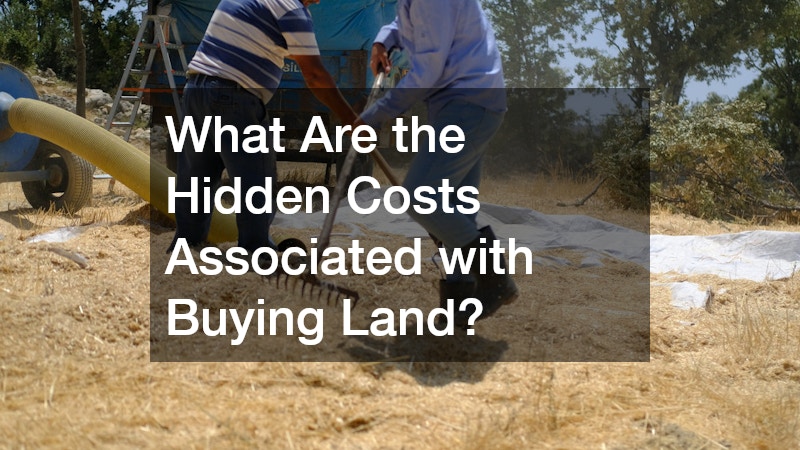Purchasing land for sale can be a significant milestone for many Australians, whether it’s for investment purposes or to build a dream property. However, this type of purchase involves more than simply choosing a block and signing a contract. Understanding the financial, legal, and practical aspects of buying land is essential to making a wise investment. This guide explores the main benefits and considerations to help buyers make informed choices when assessing land for sale.
What Are the Benefits of Buying Land for Sale?
Opportunity for Investment
One of the most appealing aspects of purchasing land for sale is its investment potential. Unlike developed properties that depreciate over time due to wear and tear, land tends to appreciate—especially when located in growing regions.
As population increases and infrastructure improves, demand for land rises, which can drive up its market value. This makes land for sale a strong long-term asset for those looking to diversify their portfolio or generate wealth through capital growth.
Personal Use and Development
Owning land for sale offers complete freedom to create the property you envision. Whether your goal is to build a family home, start a farm, or establish a commercial venture, the possibilities are vast. Unlike buying a prebuilt property, developing land allows for personalised design, modern features, and environmentally friendly construction. Additionally, rural or semi-rural land for sale may provide opportunities for sustainable living, such as solar energy or rainwater collection systems.
How Do I Evaluate the Location of Land for Sale?
Proximity to Amenities
When considering land for sale, location plays a crucial role in determining its value and practicality. Proximity to key amenities such as schools, hospitals, and shopping centres greatly influences both livability and resale potential. For investors, choosing land close to expanding urban areas or planned infrastructure developments can lead to stronger returns. Meanwhile, buyers seeking residential blocks should balance convenience with lifestyle preferences—whether that means quiet suburban living or easy access to city hubs.
Economic Growth Potential
Beyond current amenities, it’s important to assess the broader economic outlook of the area. Land for sale in regions undergoing population growth, employment expansion, or infrastructure projects often sees higher appreciation. Local council plans, transport upgrades, and new commercial developments can all be indicators of a promising investment location. Conducting thorough research helps buyers identify where future demand is likely to rise.
What Are the Legal Considerations When Buying Land?
Zoning and Land Use Regulations
Before finalising a purchase, buyers must review zoning laws that dictate how land for sale can be used. Councils establish zoning categories—such as residential, agricultural, industrial, or mixed-use—to regulate development. Understanding these regulations is crucial to avoid future disputes or project restrictions. For example, land zoned for farming may not permit residential construction without approval.
Title and Deed Verification
Ensuring that land for sale has a clear title is equally vital. Buyers should verify ownership, boundaries, and any easements or covenants that may affect usage. Working with a conveyancer or solicitor can safeguard against hidden legal issues and confirm that the transaction is legitimate. A clean title gives buyers confidence that they are purchasing the land free of encumbrances.
How Do I Finance the Purchase of Land for Sale?
Loan Options
Financing land for sale differs from standard home loans. Lenders may offer raw land loans or lot loans, depending on whether the land is undeveloped or intended for immediate construction. These loan types often have stricter approval criteria since vacant land presents higher risks for lenders. Buyers should explore different lending institutions to find competitive rates and flexible repayment options.
Down Payment and Interest Rates
Purchasing land for sale usually requires a larger deposit—often between 20% and 50%—compared to home loans. Interest rates may also be higher due to the perceived risk. It’s important to assess your borrowing capacity and secure pre-approval before making an offer, ensuring the financial process runs smoothly.
What Are the Hidden Costs Associated with Buying Land?
Property Taxes and Insurance
Owning land for sale comes with ongoing financial obligations, such as council rates, property taxes, and insurance. These expenses can vary significantly based on location, zoning, and land size. Buyers should calculate these costs early to avoid surprises after settlement.
Development and Maintenance Expenses
Beyond purchase costs, maintaining and developing land for sale can involve significant expenses. Clearing vegetation, installing utilities, or building access roads all add to the total investment. Even if you don’t plan immediate development, regular maintenance—such as weed control or fencing—helps preserve the land’s value over time.
Buying land for sale can be a rewarding venture, offering opportunities for investment, personal development, and future growth. However, it requires careful consideration of location, legal factors, financing, and ongoing expenses. By conducting thorough research and seeking professional guidance, buyers can make confident decisions and unlock the full potential of their property investment.
